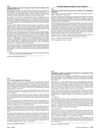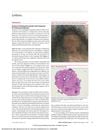Adding zinc to papaya extract speeds up wound healing.
 March 2004 in “Journal of The American Academy of Dermatology”
March 2004 in “Journal of The American Academy of Dermatology” Patients with SLE experienced non-scarring hair loss with fewer hair follicles, and DIF did not help identify lupus.
 March 2004 in “Journal of The American Academy of Dermatology”
March 2004 in “Journal of The American Academy of Dermatology” Patients with systemic lupus erythematosus and hair loss had fewer hair follicles and non-scarring alopecia; direct immunofluorescence was not helpful in diagnosing lupus in these cases.
 66 citations,
July 2015 in “Organogenesis”
66 citations,
July 2015 in “Organogenesis” Wnt signaling is crucial for skin wound healing and reducing scars.
 4 citations,
September 2023 in “Stem cell research & therapy”
4 citations,
September 2023 in “Stem cell research & therapy” Special particles from umbilical cord stem cells help heal skin wounds in diabetic mice by preventing certain immune cell death.
 20 citations,
June 2020 in “Stem Cell Research & Therapy”
20 citations,
June 2020 in “Stem Cell Research & Therapy” Using stem cells from fat tissue can significantly improve wound healing in dogs.
 7 citations,
March 2013 in “PubMed”
7 citations,
March 2013 in “PubMed” A new hair loss treatment with two unique ingredients improved hair growth.
 53 citations,
September 2007 in “Veterinary dermatology”
53 citations,
September 2007 in “Veterinary dermatology” Allergic cats with yeast overgrowth improved with antifungal treatment.
 7 citations,
March 2019 in “Journal of The European Academy of Dermatology and Venereology”
7 citations,
March 2019 in “Journal of The European Academy of Dermatology and Venereology” A man developed a skin reaction from metronidazole, which improved after stopping the drug and starting steroids.
 December 2021 in “Turkderm”
December 2021 in “Turkderm” The COVID-19 pandemic led to fewer dermatology patients, more stress-related skin conditions during the crisis, and a rise in contact dermatitis after, with ongoing concerns for public health and treatment delays.
 17 citations,
August 2019 in “JAMA Facial Plastic Surgery”
17 citations,
August 2019 in “JAMA Facial Plastic Surgery” Some men lost hair after deoxycholic acid treatment for neck fat, but most saw improvement or resolution.
 43 citations,
August 2016 in “International Journal of Nanomedicine”
43 citations,
August 2016 in “International Journal of Nanomedicine” Eupafolin nanoparticles help protect skin cells from damage caused by air pollution.
 25 citations,
June 2013 in “Obesity Reviews”
25 citations,
June 2013 in “Obesity Reviews” Mesotherapy might help reduce fat in specific areas for those close to their ideal weight, but more research and care are needed to ensure safety.
 610 citations,
April 2014 in “Nature Reviews Immunology”
610 citations,
April 2014 in “Nature Reviews Immunology” The document concludes that understanding how the skin's immune system and inflammation work is complex and requires more research to improve treatments for skin diseases.
 138 citations,
July 2015 in “Clinical, Cosmetic and Investigational Dermatology”
138 citations,
July 2015 in “Clinical, Cosmetic and Investigational Dermatology” Eating less sugar, milk, and saturated fats and more vegetables and fish may help treat and prevent acne.
 20 citations,
February 2017 in “International Journal of Dermatology”
20 citations,
February 2017 in “International Journal of Dermatology” Honokiol helps protect skin from damage and aging caused by cigarette smoke.
 18 citations,
November 2020 in “Frontiers in Cell and Developmental Biology”
18 citations,
November 2020 in “Frontiers in Cell and Developmental Biology” Inflammation plays a key role in activating skin stem cells for hair growth and wound healing, but more research is needed to understand how it directs cell behavior.
 14 citations,
October 2020 in “Journal of ethnopharmacology”
14 citations,
October 2020 in “Journal of ethnopharmacology” Lepidium sativum seed extracts helped reduce inflammation and improve insulin response in obese rats on a high-fat diet.
 13 citations,
July 2001 in “International Journal of Dermatology”
13 citations,
July 2001 in “International Journal of Dermatology” Inflammation and Demodex mites might contribute to hair loss, and targeting them could help treat it.
 9 citations,
August 2000 in “Journal of Periodontal Research”
9 citations,
August 2000 in “Journal of Periodontal Research” Finasteride reduces testosterone conversion, progesterone lessens this, and levamisole enhances finasteride's effect.
 September 2023 in “Research Square (Research Square)”
September 2023 in “Research Square (Research Square)” TNC+ fibroblasts play a key role in skin inflammation by interacting with T cells.
 April 2017 in “Journal of Investigative Dermatology”
April 2017 in “Journal of Investigative Dermatology” Eating a lot of fat increases PKCβ and inflammation in skin fat cells, which affects skin and hair health.
 28 citations,
January 2018 in “Biochemical Society Transactions”
28 citations,
January 2018 in “Biochemical Society Transactions” Certain fats in the skin help control inflammation and health, and changing these fats through diet or supplements might treat skin inflammation.
 14 citations,
May 2011 in “Facial Plastic Surgery Clinics of North America”
14 citations,
May 2011 in “Facial Plastic Surgery Clinics of North America” Laser hair removal is effective for dark hair but needs improvement for nonpigmented or fine hairs.
 8 citations,
March 2014 in “American Journal of Pathology”
8 citations,
March 2014 in “American Journal of Pathology” Damaged hair follicles make mice more prone to skin inflammation and skin cancer after UV exposure.
 August 2019 in “Journal of the American Academy of Dermatology”
August 2019 in “Journal of the American Academy of Dermatology” Ginseng and Albizia extracts help prevent hair thinning with age.

A high-fat diet caused severe health problems in female macaques but was reversible with a normal diet, while male macaques reacted differently.
 68 citations,
May 2011 in “European Journal of Dermatology”
68 citations,
May 2011 in “European Journal of Dermatology” Acne is caused by genetics, diet, hormones, and bacteria, with treatments not yet curative.
 April 2017 in “Journal of Investigative Dermatology”
April 2017 in “Journal of Investigative Dermatology” Cholecystokinin may help reduce skin inflammation in psoriasis.
 25 citations,
July 2020 in “Journal of cosmetic dermatology”
25 citations,
July 2020 in “Journal of cosmetic dermatology” Deoxycholic acid is effective for reducing chin fat but can cause side effects and serious complications, so careful patient evaluation is needed.




























